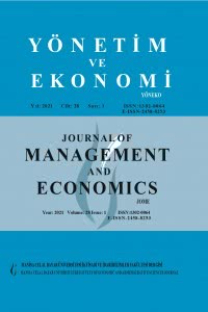Ahlaki Liderliğin Kavramsallaştırılması ve Ahlaki Yönetimde Liderliğin Rolü
Bu çalısmanın amacı liderligin ahlaki yönü üzerinde betimleyici bir analiz yapmak, literatürde yer alan degisik görüsleri ifade etmektir. Bu çalısmada, ayrıca, ahlaki bir isyeri ortamının yaratılmasında ve yönetilmesinde liderligin önemi ve sorumlugu da tartısılacaktır .
Conceptualization of Moral Leadership and the Role of Leadership in the Moral Management
The aim of this study is to make a descriptive analysis on the moral side of leadership and point out diverse perspectives on the moral leadership literature. In this study, the importance and responsibility of leadership in creating and managing an ethical workplace also will be under discussion.
___
- Arıkan, S. (2002), Girisimcilik Temel Kavramlar ve Bazı Güncel Konular, Siyasal Kitabevi,Ankara.
- Arıkan, S. (1997), Kadın Yöneticilerin Liderlik Davranısları, Hacettepe Üniversitesi, Sosyal Bilimler Enstitüsü, Yayınlanmamıs Doktora Tezi, Ankara.
- Arıkan, S. (1995), “işletmelerde Sosyal Sorumluluk ve iş Ahlakı”, Hacettepe Üniversitesi İ.İ.B.F.Dergisi, 13, 171-180.
- Arslan, M. (2001), iş ve Meslek Ahlakı, 1. Basım, Nobel Yayın Dagıtım, Ankara.
- Arslan, M. (2001), Yönetim ve Organizasyon, (Editör: Salih Güney), Nobel Yayın Dagıtım, Ankara.
- Bass, B.M. (1990), “From Transactional to Transformational Leadership: Learning to Share the Vision”, Organizational Dynamics, 18, 20.
- Bass, B.M. ve P. Steidlmeier (1999), “Ethics, Character, and Authentic Transformational Leadership Behavior”, Leadership Quarterly, 10, 181-217.
- Bovet, S.(1993), “ The Burning Questions of Ethics”, Public Relations Journal, November.
- Can, H., Tuncer, D. ve D.Y. Ayhan (2003), Genel işletmecilik Bilgileri, 14. Baskı, Siyasal Kitabevi, Ankara.
- Can, H. (2002), Organizasyon ve Yönetim, 6. Baskı, Siyasal Kitabevi, Ankara.
- Certo, S.C.(2003), Modern Management, Ninth Edition, Prentice Hall, USA. Clarke, R. ve J.Aram (1997), “Universal Values, Behavioral Ethics and Entrepreneurship”, Journal of Business Ethics, 16, 561-572.
- Dessler, G. (2001) Management Leading People and Organizations in the 21st Century, Second Edition, Prentice Hall, USA .
- Drafke, M.W. ve S. Kossen (1998), The Human Side of Organizations, Seventh Edition, Addison Wesley, USA.
- Erçetin, S. (2000), Lider Sarmalında Vizyon, 2.Baskı, Nobel Yayın Dagıtım, Ankara.
- Ergeneli, A.(1996), “işletme Etigi:işletme Ögreniminde Olması Gereken Bir Ders”, Hacettepe Üniversitesi İ.İ.B.F. Dergisi, 14 (1), 99-107.
- Güney, S. (2000), Davranıs Bilimleri, Genisletilmis 2.Baskı, Nobel Yayın Dagıtım, Ankara.
- Hartog, D.N, MuijenJ.J.V. ve P.L. Koopman.(1997), “ Transactional versus Transformational
- Leadership: An Analysis of the MLQ”, Journal of Occupational and Organizational Psychology, 70.
- Hisrich, R.D. ve M.P. Peters (2002), Entrepreneurship, Fifth Edition, Mc Graw Hill, The International Edition, NewYork.
- Hodgetts, R. ve D.F. Kuratko (1991), Management, Harcourt Brace Jovanovich Inc. Kuratko, D.F. ve R.M. Hodgetts (1995), Entrepreneurship A Contemporary Approach, Third Edition, The Dryden Press, USA.
- May, D.R., Hodges, T.D, Chan, A.Y.L ve B.J. Avolio (2003), “Developing the Moral Component of Authentic Leadership”, Organizational Dynamics, 32, 247-260.
- McHugh, F. (1992), Ethics, Yayın No:Tusiad-T/ 92, İstanbul.
- Robbins, S.P. ve D.A. DeCenzo (1998), Fundamentals of Management, Second Edition, Prentice Hall, USA.
- Simsek,S., Akgemci, T. ve A.Çelik (2003), Davranıs Bilimlerine Giris ve Örgütsel Davranıs, 3.Baskı, Adım Matbaacılık ve Ofset, Konya.
- Tracey, J.B.ve T.R. Hinkin (1998), “ Transformational Leadership or Effective Managerial Practices?”, Group & Organization Management, 23, 220.
- Yukl, G. (2002), Leadership in Organizations, Fifth Edition, Prentice Hall-International Edition,USA.
- ISSN: 1302-0064
- Yayın Aralığı: Yılda 4 Sayı
- Yayıncı: Manisa Celal Bayar Üniversitesi İktisadi ve İdari Bilimler Fakültesi
Sayıdaki Diğer Makaleler
"Yabancı Sermaye Yatırımlarının Verimlilik ve Kalkınmaya Etkilerinin Ekonometrik İncelemesi"
Y. Yüksel AYVAZ, Ercan BALDEMİR, Serap ÜRÜT
"Örgütsel Cinsiyetlerin Örgütsel Davranışa Yansıması"
Ayşen TEMEL, Mehmet YAKIN, Sema MİSCİ
Örgütsel Cinsiyetlerin Örgütsel Davranışa Yansıması
Sema MİSCİ, Mehmet YAKIN, Ayşen TEMEL
"Halka Açık Olmayan Şirketlerde Sistematik Risk Ölçütü Beta Katsayısının Tahmin Edilmesi"
İşletmeler İçin Bilgi Birikimi Yönetimi
Hüseyin ŞENKAYAS, Aykut Hamit TURAN
Halka Açık Olmayan Şirketlerde Sistematik Risk Ölçütü Beta Katsayısının Tahmin Edilmesi
Ahlaki Liderliğin Kavramsallaştırılması ve Ahlaki Yönetimde Liderliğin Rolü
